29 Jul 15 Ways to Optimize a Paid Search Campaign via @SusanEDub
Managing paid search can spoil marketers.
It’s deeply rooted in data, and this data comes in quickly after launching a new campaign.
But, that data can create another issue: there’s so much data at times, you’re not sure what to look at to make decisions – or at least what to look at first.
Before you start optimizing your campaigns, you should have a very good understanding of what your number one goal from your paid search campaigns is.
Otherwise, you’ll be trying to optimize everything – and you can wind up undoing your own progress!
Let’s look at 15 ways to optimize a paid search campaign.
1. Channel & Campaign
When you are advertising in multiple channels or campaigns, it’s important to see which channel is performing best for your primary KPI (key performance indicator), and also what might be playing a supporting role.
For example, paid search will always show higher conversion vs. YouTube, but that doesn’t mean YouTube isn’t playing a role in that eventual sale paid search is getting the credit for.
Take the time to understand which channels and campaigns are performing best, and allocate your budget accordingly.
2. Budget & Impression Share
Another aspect to optimize toward is your budget and search impression share.
This is particularly relied on heavily in bidding on your own branded terms.
Review your impression share for areas where you are defending your brand’s keywords, and also any terms that regularly convert for you.
If you are falling behind on share due to a limited budget, reexamine how you have your budget allocated.
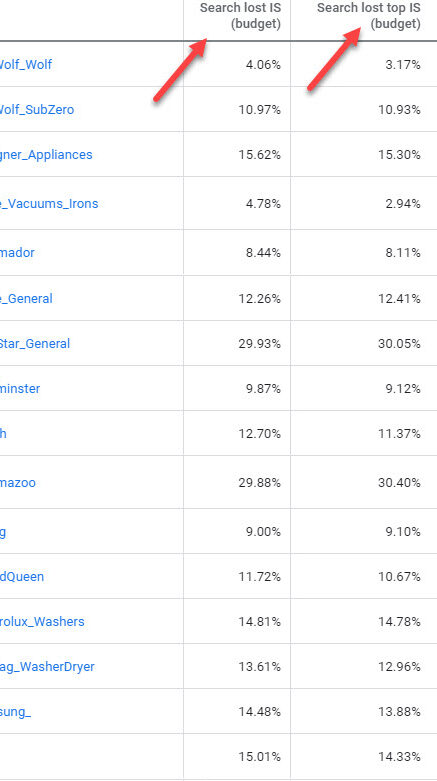

3. Hour of Day & Day of Week
Bid adjustments can be done at several different levels.
Traditional, manual bid management is done at the keyword level.
However, there are many different aspects of a paid search campaign where you could and should apply bid adjustments beyond that.
Adjusting bids by hour of day or day of week is one of those options.
Another to consider is excluding certain times of day or days of the week based on performance to ensure you maximize results.
As a best practice, I usually recommend going into Account Settings > Ad Schedule, and adding your schedule there.
Even if you run 24 hours a day, it gives you an easy visual to look at for performance, versus having to pull a report each time.
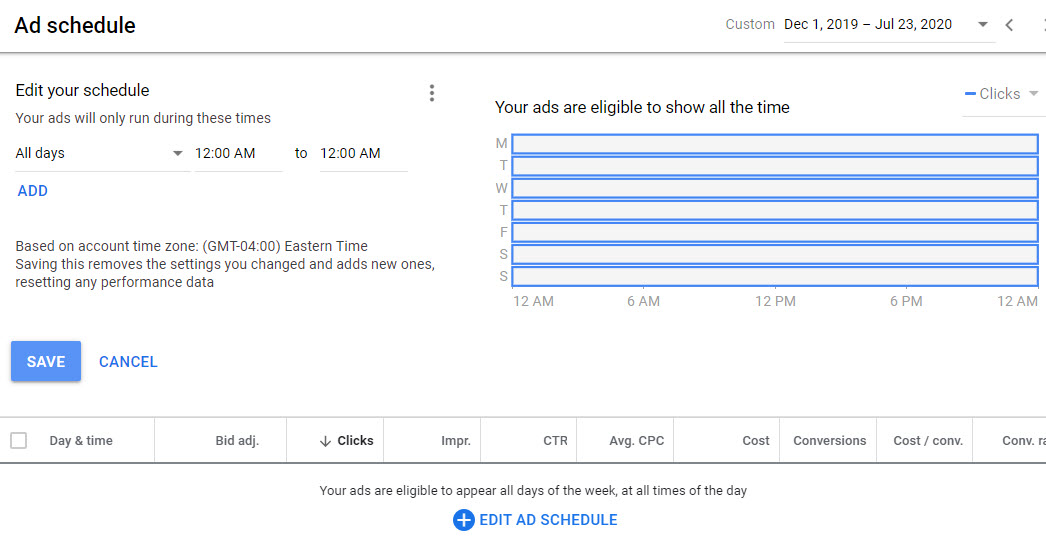

4. Location Bid Adjustments
Performance by location is extremely important – and often overlooked.
Some locations simply perform differently than others.
By continually reviewing and making adjustments toward your number one goal, you can make your campaigns more efficient.
If you’re running nationwide, it’s also important to watch how much budget the huge cities eat versus how well they convert.
You can access the reports that show you performance in Campaign > Locations > User location report or Geographic report.
Similar to hour of day optimization, you can either bid down on poorer performing locations or even consider excluding them completely.
5. Search Query Analysis & Negative Keywords
Looking at what users are actually searching for to be matched with your keywords sheds a lot of light on paid search match type logic works, but also helps you identify queries or parts of queries you do not want to appear for (as they are less relevant or not relevant at all).
This is where negative keywords come into play and are crucial to preventing wasted spend.
6. Search Partner Exclusion
Google Search Partners is, unfortunately, one of the few elements of paid search that you cannot apply bid adjustments – it’s an all or nothing option.
You either include Google Search Partners or exclude them.
Regardless, look at performance between Google Search and Search Partners on a campaign by campaign basis.
If it performs well, leave it. If it doesn’t, get rid of it.
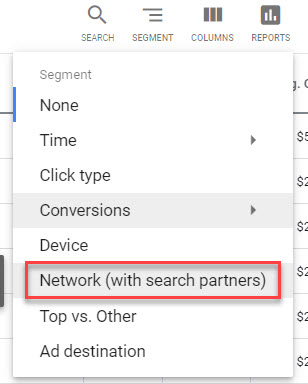

7. Keyword
Keyword bid adjustments were already mentioned, but the other aspect of keywords to review is simply performance against the goal.
Are there certain keywords that simply are not performing despite reviewing search queries, making bid adjustments, testing landing pages, and testing in different match types?
If so, perhaps these keywords need to be removed from your campaign.
8. Landing Pages
Landing pages are often overlooked when it comes to performance because they aren’t a part of the Ads account directly, but they crucial to an account’s performance.
Why are these overlooked?
Well, for one, landing pages cannot as easily be adjusted as the other elements.
Sometimes brands are unwilling or unable to invest in landing pages, but landing pages tend to be most responsible for converting users.
Keywords and ads get users to your website. Landing pages close the deal.
9. Ad Copy
Ad copy is another aspect within paid search that should be tested and optimized.
- Which ads have the highest click-through rate?
- Which has the lowest cost-per-conversion?
Google has created new ad types like RSAs and features like Experiment to help you test more easily, so embrace them!
10. Device
Device performance is also an important aspect to review.
- Are your pages and landing pages even mobile-friendly?
- How are your campaigns performing on mobile vs. computer vs. tablet?
- Do adjustments need to be made to a particular device or even excluded from a campaign?
11. Audiences
Review how your remarketing lists are performing within search and make adjustments to those as well.
Or, if you are using demographics for search, how is a particular demographic (i.e., age range) performing vs. others?
Add as many audiences as you’d like at Observation level, and watch how they each compare to your baseline users.
Then adjust the bids based on relative performance.
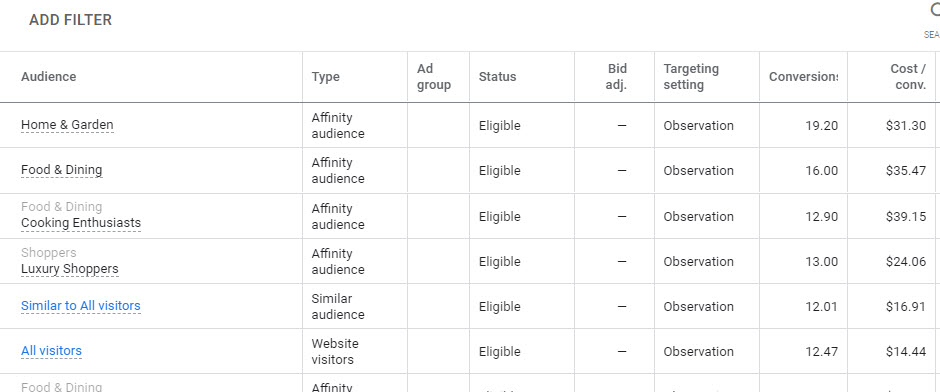

12. Conversion Counting
What is being counted as a conversion plays a role in the eventual bidding mechanism performance.
Google gives you the option to monitor a lot of different user action types, but there’s a difference between having those actions considered in bidding/conversion formulas versus having it there just as supplemental information.
Over time, old conversions might not matter, or you may add a conversion type that’s being double-counted because it’s part of an existing conversion type.
Make sure you review these periodically to ensure it’s only counting the correct user actions as a conversion.


13. Match Type Strategy
You have multiple options for how the keywords you bid on get matched to actual search queries.
Broad, Phrase, and Exact match types may all have a particular role in your account, so examine what they do for you to make some campaign structure choices.
- Does Exact work well on some terms, but is simply too expensive on others?
- Is Phrase match doing anything that Modified Broad wouldn’t do for cheaper?
Examine how different iterations of the same keyword do – and make some decisions to maximize your cost versus conversion metrics in each instance.
14. Keyword Matching
Somewhat related to several points above is also looking at how Google is choosing to match keywords to what you’re bidding on.
This isn’t exactly a match type method, but it’s a higher-level assessment.
- What Ad Groups is Google matching search queries to?
- Are they going where you want?
If Google is matching a search term all over your account, you may notice some Ad Groups simply do better for that term than others. (Or it might be matching in a way you don’t want at all!)
Make sure you add negative Exact match versions as necessary to funnel those searches how you’re intending for them to go.
An easy way to do this is to export your search terms and create a pivot table that shows you the count of Ad Groups where that search term appeared.
You can quickly identify instances where it’s matching to multiple spots:
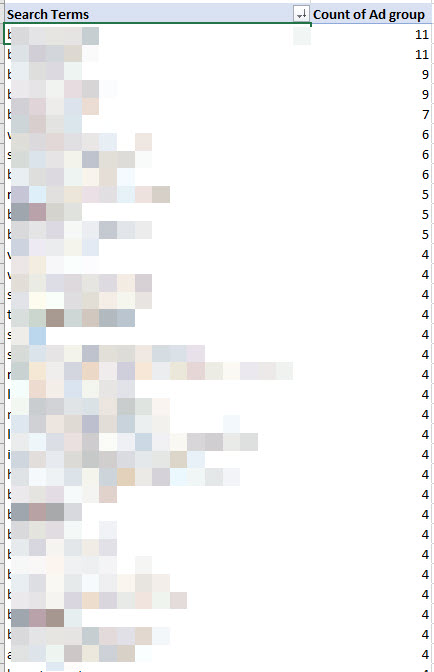

15. Use Experiments
An oft-overlooked but great feature of Google Ads is the Experiments feature.
If you want to try some optimizations, but are nervous it could adversely affect your results, Experiments will help!
This tool allows you to duplicate a setup, change the areas you want to test, and launch it to run alongside your original.
You can tell Google what percentage of searches to send to it, putting you in control of how much traffic is impacted by the test.
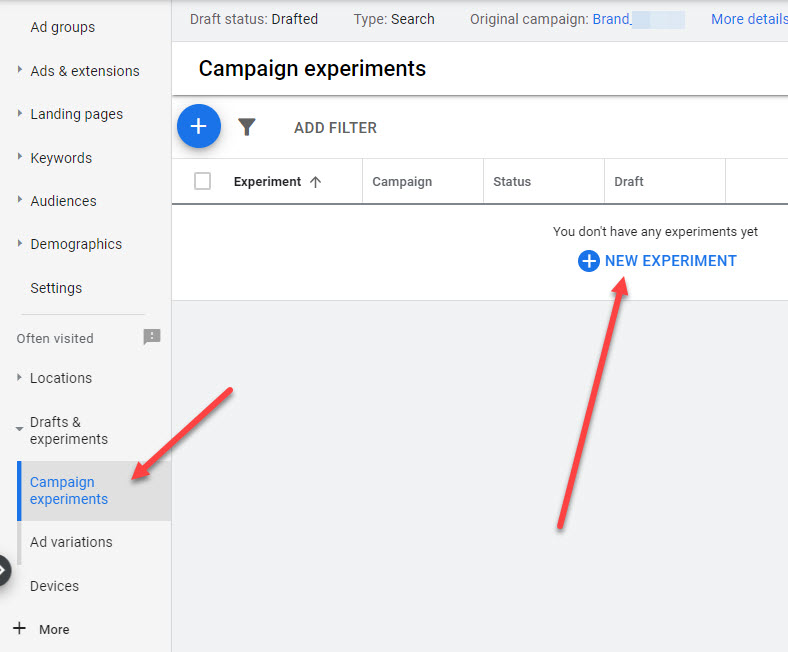

Which Areas Should You Optimize First for the Best PPC Results?
This is a loaded question, and there isn’t a simple answer.
First, it depends on your overall goal.
Second, it then depends on the current situation of your campaigns and how they are performing.
For example, are your campaigns getting a lot of clicks with a high click-through rate but few conversions?
I would then look at search queries to make sure they are relevant.
I’d then take a look at your landing pages to make sure they are following best practices.
I would also recommend looking at performance by device to see if there’s a major difference depending on the device a user is using.
Bottom line: there are several different aspects of paid search that need to be reviewed, analyzed, and optimized regularly.
The data will give you hints as to where you need to peek first, so pay close attention to it!
More Resources:
- Why Is a Previously Rocking PPC Campaign Tanking?
- 8 Ways You’re Doing Google Ads Wrong & How to Make It Right
- 8 Simple Google Ads Tips That Will Make You More Money
Image Credits
All screenshots taken by author, July 2020
Sorry, the comment form is closed at this time.